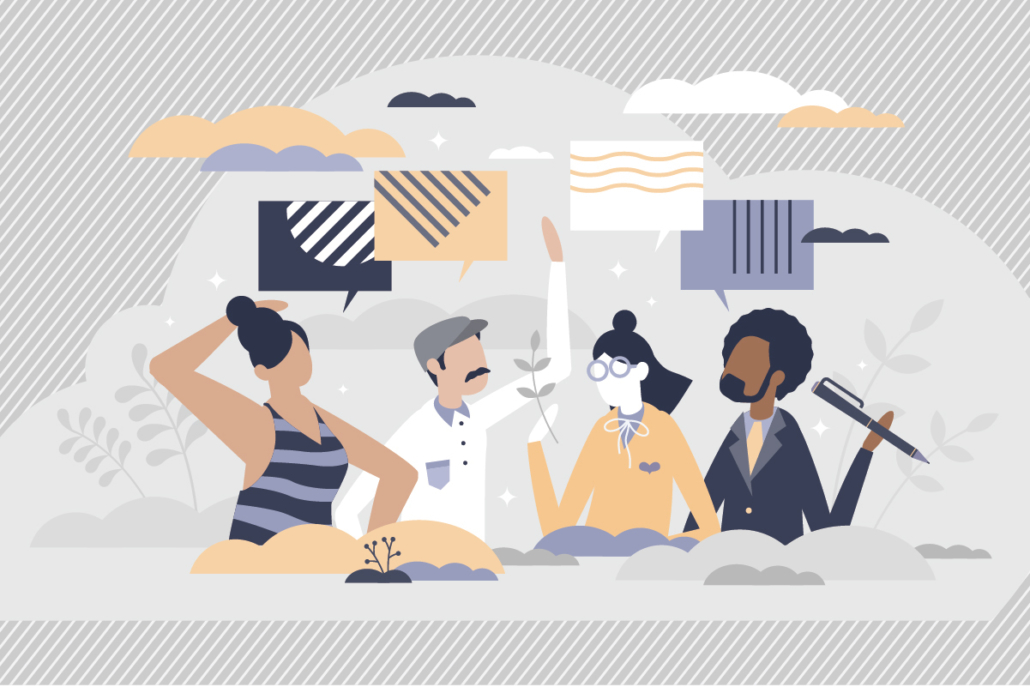
Written with Tova Ricardo
Conversations on race and racism are difficult. Whether you are a person of color putting words to a lifetime of structural inequalities and microaggressions, or are a white person coming face to face with your own privilege and participation in an unequal system, it’s hard to dig into conversations society doesn’t want you to have. Caucus groups have been a long-standing method for encouraging meaningful conversations directed to racial justice, and they are increasingly becoming part of Jewish communities.
Caucus groups are collectives of people who all have a shared identity and usually gather for specific learning purposes. Caucus groups are often an essential part of building communities committed to racial justice. Although ultimately dedicated to a multiracial future, many caucus groups are shaped by racial identity, as it can be crucial for community members of color to have a space to voice their experiences without worrying about the reactions or potential misperceptions of white people in their community.
Caucuses can be positive for everyone across racial groups. White community members who may be in earlier stages of their anti-racist learning will inevitably harbor unchecked biases and assumptions—a fact that is essential to accept as part of one’s anti-racist journey. Learning among other white people in a caucus group can provide an environment for group learning where one can challenge and rethink their biases among peers who share and can be supportive in exploring those experiences.
In racial justice movements, caucus groups have been popular models for collective consciousness-raising—developing one’s awareness of, and ability to challenge, how racism plays out on both individual and structural levels. As predominantly Jewish communities become increasingly aware of the racial diversity of Jews in the U.S., with Jews of Color comprising between 12-15% of the American Jewish population, caucus groups are beginning to emerge in Jewish settings.
Jews for Racial and Economic Justice is doing excellent community building and organizing through identity-based caucuses. JFREJ—their familiar acronym—is a New York City-based Jewish organization invested in fighting racial and socioeconomic disparities in America through campaigns on police accountability, healthcare, domestic worker rights, and education justice. JFREJ established a Jews of Color Caucus when their Movement Building Organizer, Leo Ferguson, wanted to create space in the organization specifically designated for JoCs.
Years ago, while working to uplift marginalized communities with JFREJ, Ferguson noticed that the organization was comprised of passionate movement leaders fighting for people who most likely did not look like them. He wanted a space dedicated to fostering self-advocacy practices, support networks, and community for progressive Jews of Color in New York City. With this mission in mind, Ferguson created the Jews of Color Caucus, which has provided the space for Jews of Color to gather and provide support for each other that can only be found in community with other JoCs.
In our current Jewish institutions, white Jews hold most positions of leadership and decision-making power in addition to comprising the majority of community members. A benefit of JoC-only spaces is that creative organizing can emerge as Jews of Color find new points of connection and shared experiences. From those points of connection, Jews of Color are able to harness their collective understandings, knowledge, skills, and ideas without pressures to conform to the expectations or interests of the larger white Jewish community.
Amongst the initiatives, campaigns, and events facilitated by JFREJ, Ferguson said that one of his proudest moments was hosting the Jews of Color National Convening in April 2016—to date perhaps the single largest caucusing of Jews of Color in the U.S. “Walking into the main room on the first day and seeing it filled with these brown Jews, oh my G-d, I’ve never seen anything like this before in my life. That was a really moving and special moment,” Ferguson shared.
Beyond JFREJ, caucuses have been used in other Jewish organizations to build community, provide safe spaces to speak about the lived realities of racism, and to create lasting change in the cultural and structural fabric of organizations and communities. Dimensions Educational Consulting is one example. Dimensions, led by founder and CEO Yavilah McCoy, runs a “JOC & Allies Cohort” that uses caucus-based learning opportunities for social justice leaders to strengthen relationships and build accountability with Jewish leaders of Color. Other Jewish organizations that have incorporated the caucus model as part of engaging with multiracial Jewish communities include Jewish Council of Urban Affairs, Moishe House, and the Union for Reform Judaism (URJ), among others.
Learn more about what caucuses are, how they work, and how to implement one in your community with this guide created by JustLead Washington.
